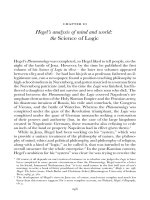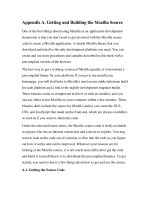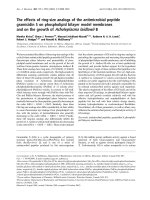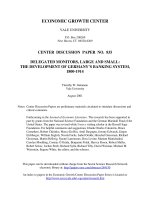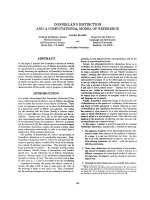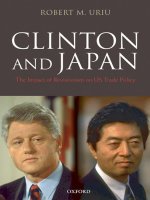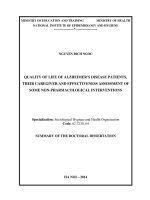China s belt and road initiative and building the community of common destiny
Bạn đang xem bản rút gọn của tài liệu. Xem và tải ngay bản đầy đủ của tài liệu tại đây (2.45 MB, 266 trang )
Series on China’s Belt and Road Initiative
Print ISSN: 2591-7730
Online ISSN: 2591-7749
Series Editors:ZHENG Yongnian (National University of Singapore,
Singapore)
Kerry BROWN (King’s College London, UK)
WANG Yiwei (Renmin University of China, China)
LIU Weidong (Chinese Academy of Sciences, China)
This book series showcases the most up-to-date and significant research on
China’s Belt and Road Initiative (BRI) by leading scholars from inside and
outside China. It presents a panoramic view on the BRI, from the
perspectives of China’s domestic policy, China’s foreign investment,
international relations, cultural cooperation and historical inheritance. As the
first English book series on the BRI, this series offers a valuable English-
language resource for researchers, policymakers, professionals and students
to better understand the challenges and opportunities brought by the BRI.
Published:
Vol. 5 China’s Belt and Road Initiative and Building the Community of
Common Destiny
edited by WANG Linggui and ZHAO Jianglin
Vol. 4 Belt and Road Initiative: Chinese Version of “Marshall Plan”?
by FENG Da-Hsuan and LIANG Hai Ming
Vol. 3 Silk Road: The Study of Drama Culture
by LI Qiang
translated by GAO Fen
Vol. 2 China’s Belt and Road: The Initiative and Its Financial Focus
by YU Xugang, Cristiano RIZZI, Mario TETTAMANTI, Fabio E.
ZICCARDI and GUO Li
Vol. 1 The Political Economy of China’s Belt and Road Initiative
by ZOU Lei
translated by ZHANG Zhiping
Published by
World Scientific Publishing Co. Pte. Ltd.
5 Toh Tuck Link, Singapore 596224
USA office: 27 Warren Street, Suite 401-402, Hackensack, NJ 07601
UK office: 57 Shelton Street, Covent Garden, London WC2H 9HE
Library of Congress Cataloging-in-Publication Data
Names: Wang, Linggui, editor. | Zhao, Jianglin, editor.
Title: China’s belt and road initiative and building the community of common destiny / edited by
Linggui Wang (Chinese Academy of Social Sciences, China) and Jianglin Zhao (Chinese Academy
of Social Sciences, China).
Description: New Jersey : World Scientific, [2019] | Series: Series on China’s belt and road initiative,
vol. 5.
Identifiers: LCCN 2019008593 | ISBN 9789813278714 (hc : alk. paper)
Subjects: LCSH: Regional economics--China--21st century. | Economic development--China. |
Infrastructure (Economics)--China. | Transportation--China. | China--Foreign economic relations-
-21st century.
Classification: LCC HC427.95 .C45554 2019 | DDC 382/.30951--dc23
LC record available at />
British Library Cataloguing-in-Publication Data
A catalogue record for this book is available from the British Library.
Sponsored by B&R Book Program
Copyright © 2019 by World Scientific Publishing Co. Pte. Ltd.
All rights reserved. This book, or parts thereof, may not be reproduced in any form or by any means,
electronic or mechanical, including photocopying, recording or any information storage and retrieval
system now known or to be invented, without written permission from the publisher.
For photocopying of material in this volume, please pay a copying fee through the Copyright Clearance
Center, Inc., 222 Rosewood Drive, Danvers, MA 01923, USA. In this case permission to photocopy is
not required from the publisher.
For any available supplementary material, please visit
/>
Desk Editors: Anthony Alexander/Ser Kei Vong
Typeset by Stallion Press
Email:
Printed in Singapore
Preface
The National Institute for Global Strategy (NIGS) of Chinese Academy of
Social Sciences (CASS) and University of International Relations jointly held
the International Think Tank Forum was held from 18th to 19th November
2016 in Beijing. The theme of the forum is “Building the Community of
Common Destiny between China and Its Neighbors: Challenges and the
Future”. After the event, participants made further explorations into the
theme of the forum. This review volume is the selection of these further
studies and represents the outcome of joint study by NIGS and major foreign
think tanks.
Recently, while exchanging ideas with foreign think tank scholars, I was
surprised by one of them who mentioned two facts. He said that, the world at
large, especially those developed economies, have formed their impression of
China from different materials and sources, 80% to 85% of which was
written or reported in English by scholars from western countries.
Conversely, among China’s materials and sources for learning about
neighbouring countries, 85% to 90% of them are from the similar origin,
which is quite narrow. As one think tank that supplies products of policy
studies, if we refer to homogeneous sources for research, will they help us
learn about other countries and serve for formulating foreign policies? Will
they help us reach more consensuses and increase mutual interests? The
answer is negative. The foundation of diversified civilizations is the
diversification of thoughts and ideas, because humans mind always craves for
various knowledge and truths.
The idea “Community of Common Destiny” has been mentioned by
Chinese President Xi Jinping in various major events and the concept of
“Raising Awareness about Human Beings Sharing a Community of Common
Destiny” has been elaborated in details. Dating back to May 2014, on the 4th
Conference on Interaction and Confidence-Building Measures in Asia,
President Xi addressed that “Asia today is home to 67% of the world’s
population and accounts for one third of the global economy”, that “Peace
and development of Asia is closely connected with the future of the mankind,
and Asia’s stability and revival is the blessing of peace and development of
the world”, and Asian countries should “jointly build a road for security of
Asia that is shared by and win–win to all”. In March of the following year,
President Xi delivered a speech titled “Towards a Community of Common
Destiny and A New Future for Asia” at the opening ceremony of Boao Forum
for Asia Annual Conference. During the speech, President Xi indicated that
community of common destiny was the “new future for Asia” and he
believed that as long as China and other Asian countries kept their goal and
work together, they would bring about common prosperity.
Facing the fast changing international and regional landscapes, we must
see the whole picture, follow the trend of our times and jointly build a
community of common destiny, which is not all about sharing common
interest, but also include of sharing responsibility. In that sense, building a
community of common destiny does not equal to establishing an institutional
arrangement that transcends ethnicity and nation. By establishing
acknowledgement of interest and obligation among Asian countries on the
foundation of mutual beneficial cooperation, we can have the opportunity to
build win–win and multi-win partnership from in-depth interaction. Aiming
at co-consultation, co-construction, sharing, and co-prosperity, the Chinese
government is making great effort to advance the development of Asian
Community of Common Destiny that embraces toleration, interaction and
integration.
When it comes to Asia, it has been known that this continent is home to
multiple cultures, whose coexistence have been relying on mutual respect and
tolerance. Over the past several decades, Asian countries have gradually
transcended their differences in ideology and social system. Mutual trust and
toleration, accumulated throughout the history, allow us to resolve serious
crisis and tackle major challenges, and serve as the theoretical and practical
foundation for joint studies on “Community of Common Destiny”. Today, we
propose the establishment of Community of Common Destiny is not only
because the interests of Asian countries become intertwined, but also need a
new dynamic to be explored for countries to coexist in this multi-polar world.
The theories and practices learned from the establishment of Asian
Community of Common Destiny may well form a new example for resolving
conflicts worldwide which is also likely to be a public model.
Wang Linggui
Senior Research Fellow, Executive Vice Chairman of Board of Directors &
Secretary General of National Institute for Global
Strategy (NIGS), Chinese Academy of Social Sciences
About the Editors
Wang Linggui, Senior Research Fellow, Executive
Vice Chairman of Board of Directors & Secretary
General of National Institute for Global Strategy
(NIGS), Chinese Academy of Social Sciences (CASS)
since the end of 2015. His major study covers China’s
belt and road, China’s global strategy,
counterterrorism issue, Middle East issue, and others.
During the period of his posi tion, he published about
400 pieces of papers, books and reports. Some of his
works were awarded by CASS and some government
institutions. He also acts as the chief of several important governmental study
projects.
Zhao Jianglin, Senior Research Fellow, Deputy
Secretary of National Institute for Global Strategy
(NIGS), Chinese Academy of Social Sciences
(CASS). Her research areas cover International
Economics, China’s Belt and Road Initiative, and
others. During the period of her position, she has
published papers, books and reports and also acts as
the chief of study projects.
Contents
Preface
About the Editors
Part 1 Conceptual Exploration
Chapter 1 Introduction
The Community of Common Destiny between China and its
Neighbors: A New Paradigm for Promoting World Socio-
Economic Development
Wang Linggui & Zhao Jianglin
Chapter 2 Building a Community of Common Destiny: The Choice for the
West is Either “Staying the Course” or Undertakes “Course
Correction”
Syed Hasan Javed
Chapter 3 Building the Community of Common Destiny between China
and its Neighbors: The Prospect and Policy Suggestion
Romyen Kosaikanont
Chapter 4 Building the Community of Common Destiny
Kyee Myint
Chapter 5 Building a Community of Common Destiny between China and
the Neighboring Countries: Concept, Connotation and Approach
Wang Junsheng
Part 2 Economic Community
Chapter 6 Philippines–China Trade, Economic Cooperation, and Prospects
for Policy Research
Danilo C. Israel
Chapter 7 Building a Community of Common Destiny between China and
its Neighbors: Challenges and the Future of Economic
Cooperation in China–Sri Lanka Relations
Dushni Weerakoon
Chapter 8 Economic Cooperation between China and Central Asia
Roman Mogilevskii
Chapter 9 Opportunities for Investment in Mongolia
Chuluungombiin Narantuya
Chapter 10 Tourism: Economic and Cultural Bond between China and Nepal
Bishnu B. Khatri
Part 3 Cultural Community
Chapter 11 Bridging China and Indonesia: The Role of Chinese Indonesians
Hoon Chang Yau
Chapter 12 Promoting Regional People-to-People Exchange and
Establishing Mechanisms of Exchange and Cooperation among
Regional Think Tanks
Chauyen Lai Shrestha
Chapter 13 A Preliminary Study of Southeast Asian Foreign Policy Think
Tanks’ Attitudes towards China
Ngeow Chow Bing
Part 4 Security Community
Chapter 14 Security Issues Faced by Asian Countries and its Suggestions
Park Jiyoung
Chapter 15 China and its Adjacent Areas: Terrorist Threat Situation and
Countermeasures
Chen Li
Chapter 16 Afghanistan’s Understanding of Building a Community of
Common Destiny between China and its Neighbors
Sayed Mahdi Munadi
Chapter 17 Building a Community of Common Destiny: Cambodia–China
Military Cooperation
Kin Phea
Chapter 18 CICA Mechanism: The Progress Status and Prospect
Yang Danzhi
Part 5 Regional Community
Chapter 19 The Future of Thai-Chinese Relationship: Challenges and
Opportunities
Sompong Sanguanbun
Chapter 20 Building a Community of Common Destiny From the Laos’
Perspective
Lattana Thavonsouk
Chapter 21 Forging a Community of Common Destiny between China and
Central Asia
Kemel Toktomushev
Chapter 22 Suggestions on the Cooperation between China and ASEAN in
the New Situation
Jinsen Du
Chapter 23 The Belt and Road Initiative and ASEAN Connectivity: Synergy
Issues and Potentialities
Bruno Jetin
Chapter 24 Colliding Nationalisms: Interstate Relations in Asia
Sow Keat Tok
Chapter 25 The Future of Transnational Cooperation in Eurasia
Yulia A. Kryachkina
Index
Part 1
Conceptual Exploration
Chapter
1
Introduction
The Community of
Common Destiny between
China and its Neighbors: A
New Paradigm for
Promoting World Socio-
Economic Development
Wang Linggui and Zhao Jianglin
National Institute for Global Strategy (NIGS), Chinese
Academy of Social Sciences, Beijing, China
On 18th to 19th November 2016, the National Institute for Global Strategy
(NIGS), Chinese Academy of Social Sciences (CASS) and University of
International Relations, organized the International Think Tank Forum on
“Building the Community of Common Destiny between China and Its
Neighbors: Challenges and the Future” in Beijing. About 30 experts from
China’s 20 neighboring countries and 30 experts from China gathered to
discuss the theories and practices with regards to promoting the Community
of Common Destiny (CCD) between China and its neighbors.
The participating experts generally agreed that the CCD was a new
paradigm for promoting regional socio-economic development, and for
shaping international cooperation and international order from an entirely
novel perspective. Although countries and regions are having varied socio-
economic development difficulties and challenges, and their understanding of
the concept of the CCD differs, the notion for common development and
common security is widely shared and generally advocated by all
participating scholars.
The Community of Common Destiny: A New
Perspective for Shaping International Cooperation
and International Order
Exploring the Connotation of the CCD
Views of the Chinese Scholars
Prof. Cai Fang, Vice President, CASS and Chairman of Board of Directors,
NIGS, CASS, pointed out that the Chinese government has been strongly
advocating for an inclusive, interactive and integrated approach to the process
of building the CCD for consultation and common development. Think tanks
play an important and indispensable role in such an endeavor.
Mr. Lu Zhongwei, Former Director-General of China Institute of
Contemporary International Relations, talked about the advantages of
building the CCD in terms of political relations, geographical neighborhood,
and economic complementarity. He suggested to translate those advantages
into incentives and benefits for practical collaboration, mutual support, and
sustainable growth among countries in the region.
Views of the Foreign Scholars
Mr. Syed Hasan Javed, Ambassador (Retired) of the Foreign Service of
Pakistan, and Director of Chinese Studies Centre, National University of
Science and Technology (NUST) of Pakistan, commented that China is a
main driving force for peace and development, and went on to say that one
should acknowledge and understand China’s peaceful rise. The past
development model was a zero-sum game, which had caused many
difficulties, but China’s rise provides the world with a reason and an
opportunity for optimism. What the Belt and Road Initiative (BRI) advocates
is exactly a win–win development model. We should not be conned to the old
way of thinking.
Mr. Kyee Myint, Senior Researcher, Myanmar Institute of Strategic and
International Studies (Myanmar ISIS) believed that the concept of building
the CCD had four main principles. Firstly, it assures that all countries treat
each other equally and with respect. Secondly, it seeks win–win cooperation
and shared development. Thirdly, it aims for collaboration and sustainable
security. And lastly, it promises inclusiveness and mutual learning among
civilizations. The CCD is an important strategy of China for ensuring
peaceful and stable relations with its neighbors. It is believed that the CCD is
in essence of China’s efforts to develop cordial relations with its neighbors to
ensure a peaceful and stable external strategic environment. The concept of
the CCD is centered on economic initiatives. The AIIB and the BRI are the
two main pillars of this concept. Its ultimate goal is to demonstrate China’s
responsibility as a big country, and to establish a new world economic order.
Opportunities and Challenges Facing the Building of the CCD
Views of the Foreign Scholars
Ms. Yulia A. Kryachkina, Researcher of Russian Institute for Strategic
Studies (RISS), commented that Russia’s present strategy in the Asia and
Pacific region was very clear. Russia hopes to connect with the BRI as well
as other projects, such as the Eurasia Economic Union and the Eurasia
Initiative of Korea. The cooperation between China and Russia in the
economic area has been dynamic and significant, as well as in the political
arena. To address the security issues, the key is to build mutual trust for
development. Mr. Sayed Mahdi Munadi, Director of Center for Strategic
Studies (CSS), Ministry of Foreign Affairs of Afghanistan, argued that the
Asia region was facing serious challenges from separatism, terrorism and
extremism. Actions are needed to maintain regional peace and development.
In that regard, mutual support under the concept of CCD is necessary.
Security and economy are complementary to each other, since economic
initiatives are effective ways to deal with unemployment, poverty and energy
shortage. On the other hand, Mr. Munadi argued that alliances or associations
of any forms should be discouraged and the BRI should be pursued in
indirect ways. What is needed today in the region is a new form of
conservatism for measured, rather than radical changes.
Mr. Sompong Sanguanbun, Dean of Institute of Diplomacy and
International Studies, Rangsit University, Thailand, commented that the long
history of relationship between China and Thailand goes back to a thousand
years. The two countries share common values and traditions and have
similar religions. In recent years, the Sino-Thai relationship has developed
very rapidly. For future development, China will need to assure other
countries that winners will not take all. It will also be necessary to take into
consideration the interests of all countries and commit to shared
responsibilities.
Mr. Sow Keat Tok, Deputy Director of Centre for Contemporary Chinese
Studies, Asia Institute, University of Melbourne, Australia, believed that
nationalism was harmful to the common development of Asia Pacific
countries, which made it extremely difficult to form any global thinking.
Therefore, it is necessary to control nationalistic extremists.
Views of the Chinese Scholars
Mr. Wu Li, Director and Senior Research Fellow of Tibet Think Tank,
CASS, believed that the building of CCD was aligned with the world
development trend. The BRI and the CCD reflect China’s efforts to promote
common development, win–win cooperation and open-minded approach of
China for friendship and peaceful development in the region.
Mr. Xu Yongquan, Deputy Director of China Center for Contemporary
World Studies, International Department of Central Committee of CPC,
underscored the importance of the BRI and the CCD and stated that they
were actually public goods that the Government of China provided to the
world.
Mr. Huang Renwei, Deputy Director of Shanghai Academy of Social
